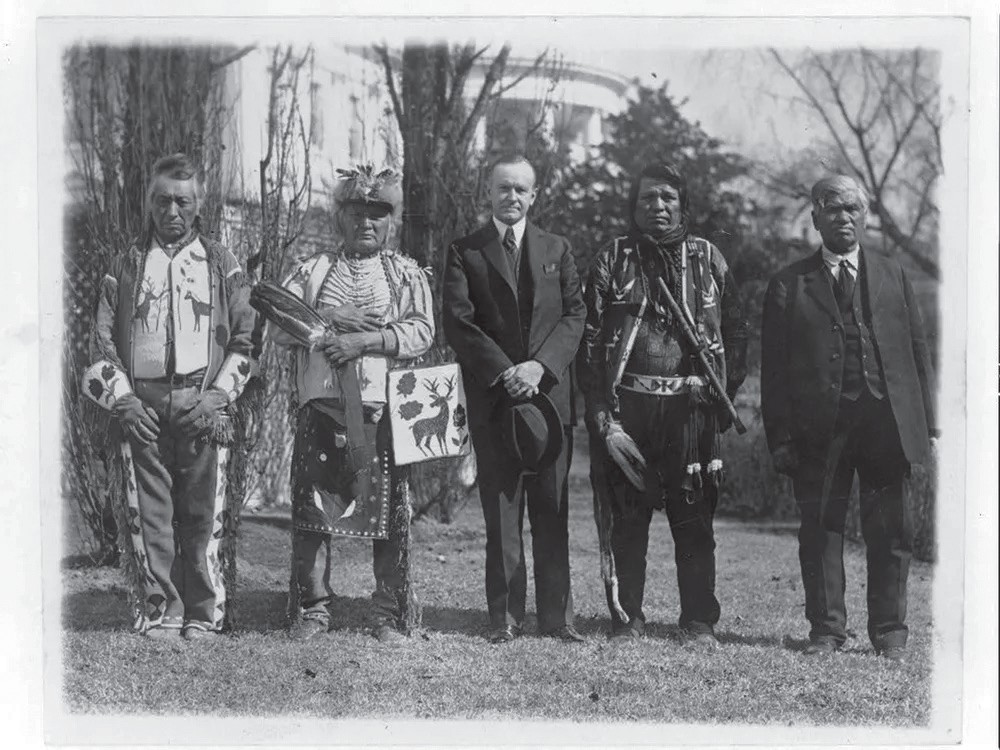The birthright controversy

Calvin Coolidge poses with Native American leaders on the White House lawn in 1925. This photo was taken shortly after Coolidge signed the epoch making Indian Citizenship Act of 1924 into law. (Library of Congress Prints and Photographs Division)
RAPID CITY—President Trump’s campaign promise to deport illegal immigrants has produced an executive order attacking birthright citizenship. The Fourteenth Amendment reads “all persons born or naturalized in the United States and subject to the jurisdiction thereof, are citizens of the United States and the State in which they reside.”
Trump’s legal team argues that “subject to the jurisdiction thereof” excludes babies born to non-citizens, asserting, like their parents, they are not subject to the jurisdiction of the United States.
But a federal judge, John Coughenour, appointed by Ronald Reagan, has issued a temporary restraining order blocking Trump’s executive order. Coughenour believes the executive order is “blatantly unconstitutional,” and he goes on to say, “I have been on the bench for over four decades. I can’t remember another case where the question presented was so clear.”
The case is scheduled to be reheard by Coughenour on February 6, until then action on the executive order is frozen.
One of the arguments presented by Trump’s legal team to advance their interpretation of “subject to the jurisdiction thereof,” has alarmed most of Indian Country. Trump’s team cited an 1884 Supreme Court decision, Elk v Wilkins, asserting that children of non-resident aliens lack a constitutional birthright to citizenship, even if born in the United States. They argue that because in Elk v Wilkins, the Court held that because tribal members owe immediate allegiance to their tribe, “they are not subject to jurisdiction of the United States and are not constitutionally entitled to citizenship.” Meaning that if children are born to tribal members, they too are not citizens despite being born in the United States.
This was true in 1884, but the 1924 Indian Citizenship Act made all tribal members US citizens, and renders any previous declared citizenship status, including 1884 Elk v Wilkins, moot. No previous legal ruling applies if it should deny the citizenship of all tribal members.
Tribes and the media have largely ignored this salient fact and as a result tribes have been kept alarmed at the prospect Trump is after their citizenship. Trump’s legal team was well aware of that and so their argument was looking for an historic precedent, which no longer applied to tribes, but the logic from the 1884 decision still did. They argue the Indian Citizenship Act of 1924 only excludes tribal members from the 1884 decision, but that other non-resident aliens would still be logically bound to the Court ruling. The 14th Amendment was added to the Constitution 16 years before Elk v Wilkins, which is why the argument centers on “subject to the jurisdiction thereof,” which are words from the 14th Amendment.
This is an example of how the media misunderstood why 1884 Elk v Wilkins was cited: “However, in a recent document defending the birthright citizenship Order, the Department of Justice, under Trump, falsely claimed that children of Native Americans are not entitled to citizenship.”
This is inaccurate. The argument was addressing the status of tribal members before 1924, when they were not entitled to citizenship. The Department of Justice never claimed Native Americans are not entitled to citizenship. Trump’s legal team was not addressing anything post 1924, but arguing that the status of Indians before 1924 sets precedent for denying citizenship to present day anchor babies.
The argument on February 6 between Trump and Judge Coughenour will focus on the interpretation of “subject to the jurisdiction thereof.” But however the decision turns out, the executive order does not threaten the citizenship of tribal members in any way. It was perhaps not the best optics to bring up tribal citizenship, but it was the only argument Trump had that can logically empower his executive order.
(James Giago Davies is an enrolled member of OST. Contact him at skindiesel@msn.com)
The post The birthright controversy first appeared on Native Sun News Today.
Tags: Top News
